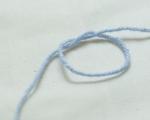Friendship and love as special types of relationships. Friendship and love
Daniil Ivanovich Yuvachev (1905 - 1942) at school came up with a pseudonym for himself - Kharms, which varied with amazing ingenuity, sometimes even in the signature under one manuscript: Kharms, Horms, Charms, Khaarms, Shardam, Kharms-Dandan, etc. The fact is that Kharms believed that an unchanged name brings misfortune, and took a new surname as if in an attempt to get away from him. However, it was the pseudonym "Kharms" with its duality (from the French "charme" - "charm, charm" and from the English "harm" - "harm") that most accurately reflected the essence of the writer's attitude to life and work.
Daniil Yuvachev was born on December 17 (30), 1905 in St. Petersburg, in the family of Ivan Yuvachev, a former naval officer, a People's Will revolutionary who was exiled to Sakhalin and took up religious philosophy there. Kharms' father was familiar with Chekhov, Tolstoy and Voloshin.
Daniel studied at a privileged St. Petersburg German school. In 1924 he entered the Leningrad Electrotechnical School, but was soon forced to leave it. In 1925 he took up writing.
In 1925, Yuvachev met with the poetic and philosophical circle of plane trees. He quickly gained scandalous fame in the circles of avant-garde writers under his pseudonym "Kharms" invented at the age of 17. Kharms was admitted to the All-Russian Union of Poets in March 1926 on the basis of the submitted poetic works, two of which (“The Case on the Railway” and “The Verse of Pyotr Yashkin the Communist”) managed to be printed in small-circulation collections of the Union.
The early Kharms was characterized by "absurdity", he joined the "Order of the abstruse DSO" headed by Alexander Tufanov. Since 1926, Harms actively tried to organize the forces of the "left" writers and artists of Leningrad, creating the short-lived organizations "Radiks", "Left Flank". In 1927, S. Marshak attracted Kharms to work in children's literature. So Kharms received his first publications and the first money from them. Profit from publications remained almost the only source of money throughout the life of Kharms. He didn’t work anywhere else, when there weren’t any (and it was like that all his life), he borrowed money. Sometimes he gave it on time, sometimes he didn't give it at all.
In February, the first issue of the children's magazine "Hedgehog" was published, in which Kharms' first children's works "Ivan Ivanovich Samovar" and "Naughty Cork" were published. Since 1928, Kharms has been writing for the children's magazine Chizh. Surprisingly, with a relatively small number of children's poems ("Ivan Ivanovich Samovar", "Liar", "Game", "Million", "How Dad Shot My Ferret", "A Man Came Out of the House", "What was that?", "Tiger in the street" ...) he created his country in poetry for children and became its classic.
Then Kharms became one of the founders of the avant-garde poetic and artistic group "Association of Real Art" (OBERIU). Later, in Soviet journalism, the works of OBERIU were declared "the poetry of a class enemy", and since 1932, the activities of OBERIU in the previous composition ceased.
In December 1931, Kharms was arrested along with a number of other Oberiuts, accused of anti-Soviet activities and sentenced on March 21, 1932 by the OGPU board to three years in correctional camps. But two months later the sentence was commuted to expulsion, and the poet went to Kursk.
He arrived on July 13, 1932. “The city in which I lived at that time,” he wrote about Kursk, “I did not like at all. It stood on a mountain, and postcard views opened up everywhere. I was so sick of them that I was even glad to stay at home. Yes, in fact, except for the post office, the market and the store, I had nowhere to go ... There were days when I did not eat anything. Then I tried to create a joyful mood for myself. He lay down on the bed and began to smile. I smiled up to 20 minutes at a time, but then the smile turned into a yawn ... ".
Kharms stayed in Kursk until the beginning of November, and returned to Leningrad on the 10th. He continued to communicate with like-minded people and wrote a number of books for children to earn his living. After the publication in 1937 in a children's magazine of the poem "A man came out of the house with a club and a bag", which "had disappeared since then", Kharms was no longer printed. This put him and his wife on the brink of starvation.
On August 23, 1941, Kharms was arrested for defeatist sentiments on the denunciation of an NKVD agent. In particular, Kharms was charged with his words: “If they give me a mobilization sheet, I will punch the commander in the face, let them shoot me; but I won’t wear a uniform” and “The Soviet Union lost the war on the very first day, Leningrad will now either be besieged and we will die of starvation, or they will bomb it, leaving no stone unturned.” To avoid being shot, Kharms feigned insanity. The military tribunal determined to keep Kharms in a psychiatric hospital. There, Daniil Kharms died during the siege of Leningrad, in the most difficult month in terms of the number of starvation deaths.
Daniil Kharms was rehabilitated in 1956, but for a long time his main works were not officially published in the USSR. Until the time of perestroika, his work went from hand to hand in samizdat, and was also published abroad with a large number of distortions and abbreviations.
“I am only interested,” Harms wrote on October 31, 1937, “to "nonsense"; just something that doesn't make any practical sense. I am interested in life only in its absurd manifestation. Heroism, pathos, prowess, morality, hygiene, morality, tenderness and passion are words and feelings that I hate.
But I fully understand and respect: delight and admiration, inspiration and despair, passion and restraint, debauchery and chastity, sadness and grief, joy and laughter.
Real name - Yuvachev Daniil Ivanovich. Born December 17 (30), 1905 in St. Petersburg, died February 2, 1942 in Leningrad. Russian writer and poet.
Your main pseudonym "Daniil Kharms" Daniil came up with during his school years (approximately in 1921-1922). This pseudonym he first signed school notebooks. Later alias became an official name (It is known that Kharms first signed Yuvachev-Kharms in the passport with a pencil, and then legalized his alias - Kharms).
About the origin alias researchers are still arguing. Many literary scholars have repeatedly attempted to decipher in their own way alias writer, putting forward many versions of his origin, finding the origins in English, German, French, Hebrew, Sanskrit. (For example, some erect his false surname "Kharms" to the French "charme" - "charm, charm", some to the English "harm" - "harm").
But the most common version is that alias inspired by the beloved Conan Doyle and associated with the name of Sherlock Holmes, since Holmes and Kharms- surnames are consonant. Also, the reason for this version was the description of Kharms' manner of dressing, mentioned by memoirists, as "a London dandy". In the few photographs Kharms easily recognizable by the indispensable pipe and style of dress (he wore short gray stockings, gray stockings and a large gray cap).
In addition to the main pseudonym Daniil Kharms used over 40 more pseudonyms(the exact number is unknown): DCH, Daniel Charms, Daniel, Daniil Zatochnik (Kharms), Daniil Kharms, Daniil Kharms School of plane trees Vzir zaumi, School of plane trees Vzir Zaumi Daniil Kharms, D. Kh., Chinar Daniil Ivanovich Kharms, D. Kharms, D. I. Kharms, D. Bash, Daniil Horms, Daniil Khharms, Khkhoerms, Daniel Khaarms, Daniil Khaarms, Daniel Protoplast, Dan. Kharms, (Yaroneya), Kharms, Daniil Dandan, Dan. Kharms, (Yaroneya), Kharms, Daniil Dandan, Dandan, Daniil Ivanovich Kharms, D. Kharms-Shardam, Daniil Shardam, Shardam, Daniil Kharms-Shardam, Vanya Mokhov, Karl Ivanovich Shusterling, Charms, Daniil Charms, Harmonius; Faith, Hope, Love, Sofia; Khaarms, D., Daniil, Daniil Ivanovich Dukon- Kharms, A. Sushko, Writer Kolpakov, and others.
The reason for such frequent name changes Kharms explained quite simply. He believed that an unchanging name brings bad luck. This is evidenced by the following diary entry. Kharms dated December 23, 1936: “Yesterday, dad told me that while I was Kharms, I would be haunted by needs.” And in order to avoid misfortunes, Kharms took himself a new one every time. alias. Most of them are formed from the first alias. For example: Daniil Ivanovich Kharms, D. Kharms, D. I. Kharms, Daniil Horms, Daniil Kharms, Khkhoerms, Daniel Khaarms, Daniel Khaarms, DCH, Daniel Charms, Daniel, DaNiil Kharms and etc.
Such aliases, as Daniil Kharms School of Chinari Vzir Zaumi, School of Chinari Vzir Zaumi Daniil Kharms, Chinar Daniil Ivanovich Kharms testify to the desire Kharms to emphasize their belonging to the then new left "current".
Aliases Shardam Kharms-Shardam, Daniil Shardam, Shardam, Daniil Kharms-Shardam are in tune with Sherlock Holmes.
Aliases Vanya Mokhov, Karl Ivanovich Shusterling, Writer Kolpakov, A. Sushko, D. Bash - these are the so-called "childish" pseudonyms of Kharms, which are distinguished by a special "liberty" in their education.
Nickname"Faith, Hope, Love, Sofia" - Christian turner "faith - hope - love" supplemented with "sophia", i.e. wisdom.
Was born D. Harms Petersburg, with which his whole life is connected. Here he studied, here he began to write his first poems. As a professional poet, he entered literature in the mid-1920s, when some of his poems appeared in almanacs.
Kharms was one of the founders of the literary group OBERIU (Association of Real Art), which included the poets A. Vvedensky, N. Zabolotsky, Yu. Vladimirov and others, who used the techniques of alogism, absurdity, grotesque. In 1927 Kharms's play "Elizabeth to You" was staged on the stage of the Press House. Harms read his works at meetings with the public, his poems and stories were distributed in manuscripts. In 1930, the activities of OBERIU as an "association of formalists" were banned. Marshak, highly appreciating talent Kharms, attracted him to work with children's literature. Since 1928 Kharms published poems for children in the magazines "Chizh" and "Ezh". Several children's books were also published, including such well-known ones as "Ivan Ivanovich Samovar", "Game", "Million".
Spare parts for cars in Chekhov.
D. Harms was arrested on August 23, 1941, and died on February 2, 1942, while in a psychiatric hospital. His name was deleted from Soviet literature, and only in 1956 were his works rehabilitated. In the 1960s, his books were republished, the play "Elizabeth to You" returned to the theater repertoire.
Real name Yuvachev (1905-1942), Russian writer. In poetry, plays (“Elizaveta Bam”, staged in 1927), the story “The Old Woman” (1939, published in 1991), grotesque stories (cycle “Cases”, 1933 39, published posthumously), the originality of poetics ... ... encyclopedic Dictionary
Kharms, Daniil Ivanovich- Daniil Ivanovich Kharms. HARMS (real name Yuvachev) Daniil Ivanovich (1905-42), Russian writer. Entered OBERIU. In poetry, plays (“Elizaveta Bam”, staged in 1927), the story “The Old Woman” (1939, published in 1991), grotesque stories (cycle ... ... Illustrated Encyclopedic Dictionary
HARMS (real name Yuvachev) Daniil Ivanovich (1905-42) Russian writer. In the play Elizabeth Bam (staged in 1927), the story of the Old Woman (1939, published in 1991), in grotesque stories (cycle Cases, 1933 39, published posthumously) showed ... ... Big Encyclopedic Dictionary
HARMS Daniil Ivanovich- HARMS (real name Yuvachev) Daniil Ivanovich (190542), Russian Soviet writer. The play "Elizabeth to you" (post. 1927). Book. poems and stories for children "Naughty traffic jam", "Theatre" (both 1928), "About how Kolka Pankin flew to Brazil, and ... ... Literary Encyclopedic Dictionary
- (Yuvachev). Genus. 1905, mind. 1942. Writer (poet, prose writer, playwright) (absurdist). Professionally engaged in literary work in 1925. Member of the Order of Zaumnikov, later of the Association of Real Art (OBERIU), the Association of Children's Writers ... ... Big biographical encyclopedia
- (real name Yuvachev; 1905/06 1942) - Russian. writer. In lit ru entered the middle. 20s In poetry, plays ("Elizaveta Bam", post. 1927), pov. "The Old Woman" (1939), grotesque stories (cycle "Cases", 1933 39) showed the absurdity of being, depersonalization ... ... Encyclopedic Dictionary of Nicknames
Daniil Kharms Birth name: Daniil Ivanovich Yuvachev Date of birth: December 17 (30), 1905 Place of birth: St. Petersburg Date of death: February 2, 1942 Place of death: Leningrad ... Wikipedia
Daniil Kharms Birth name: Daniil Ivanovich Yuvachev Date of birth: December 17 (30), 1905 Place of birth: St. Petersburg Date of death: February 2, 1942 Place of death: Leningrad ... Wikipedia
Kharms, Daniil Ivanovich Daniil Kharms Birth name: Daniil Ivanovich Yuvachev Date of birth: December 17 (30), 1905 ... Wikipedia
Books
- Stories, sketches, sketches, Kharms Daniil Ivanovich. Daniil Ivanovich Kharms (real name Daniil Ivanovich Yuvachev) poet, prose writer, one of the organizers and active authors of the OBERIU group, a classic of Russian literature., Born in St. Petersburg on 30 ...
- Stories, sketches, sketches, Kharms Daniil Ivanovich. This book will be produced in accordance with your order using Print-on-Demand technology. Daniil Ivanovich Kharms (real name Daniil Ivanovich Yuvachev) poet, prose writer, one of the organizers and ...



